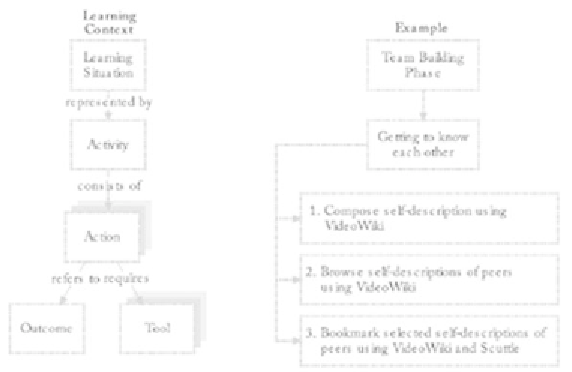Information Technology Reference
In-Depth Information
Figure 5. Semantic model of learning activities and a concrete example
of the script), the system initiates a user dialogue
to specify its contents.
In analogy to variable declarations, an outcome
can optionally be defined with a specific value. An
initialized outcome means that it has a predefined
value. An outcome without a value, however,
is indicating that it is either an abstract goal or
artefact, or the 'value' is assigned dynamically if
it is used somewhere, e.g., if a URL placeholder
has to be resolved. In the example described in
the last three figures, for instance, the very first
action requests the learner to create a VideoWiki
recording that is supposed to be the outcome
'self-description'.
In addition, the bookmarking-action is intended
to trigger data exchange between the videoWiki
and scuttle - a tool combination that requires a
certain degree of interoperability of the learn-
ing tools. As a precondition for these connect
statements, we built upon an API for distributed
feed networks (Wild & Sigurdarson, 2008). If
this kind of interoperability is not supported, an
error is given.
Technologically, this prototype is realized
as part of the OpenACS system, an open source
development framework for building scalable,
community-oriented web applications (see http://
openacs.org). The LISL interpreter is written
in the programming language Tcl, precisely
its object-oriented extension named XoTcl (cf.
http://media.wu-wien.ac.at/whatIsXOTcl.html).
It builds upon the free Wiki generator XoWiki
(see http://openacs.org/xowiki) and is part of the
MUPPLE package. The package, including the
source files, can be retrieved from the iCamp code
repository at Sourceforge (http://sourceforge.net/
projects/icamp).
Figure 6 visualizes how the MUPPLE proto-
type works beneath the surface. While interacting
with the user interface, the learner interactions
are materialized in the form of LISL commands
which are appended to the script of the current
activity. This new LISL code is persisted into
a Wiki page, using the persistence and version
control functionality of the XoWiki component.
Furthermore, each new line of code is parsed
and interpreted by the LISL interpreter, which
creates and updates the activity structure and
the web application mash-up. Additionally, the
MUPPLE prototype includes also learner support
functionality, like recommendation services and
manual practice sharing facilities, as will be ex-
plained in the upcoming subsection. Interpreting
the whole LISL script, the interpreter calculates

Search WWH ::

Custom Search